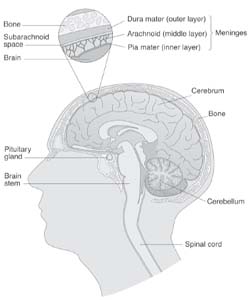Overview
Medulloblastomas
Most brain tumours are named after the type of cells from which they develop. Medulloblastomas are malignant tumours formed from poorly developed cells at a very early stage of their life. They develop in the cerebellum (see diagram below), in a part of the brain called the posterior fossa, but may spread to other parts of the brain.Very rarely, medulloblastomas may spread to other parts of the body. If they do spread to other parts of the brain, or to the spinal cord, this is usually through the cerebrospinal fluid (CSF). CSF is the fluid that surrounds and protects the brain and the spinal cord.
Medulloblastomas are more common in children, particularly between the ages of three and eight. They make up about one in five (20%) of all childhood brain tumours. The tumour is more common in boys than girls. They can also occur in adults, but this is extremely rare.

Causes of a medulloblastoma
As with most brain tumours, the cause of medulloblastoma is unknown. Researchers are continuing to work at finding possible causes.Signs and symptoms
The first symptoms of any brain tumour are usually due to increased pressure within the skull (raised intracranial pressure). This may be caused by a blockage in the ventricles (fluid-filled spaces in the brain), which leads to a build-up of CSF, or by swelling around the tumour itself.The following are the most common symptoms of a medulloblastoma, however each child may experience symptoms differently. Medulloblastomas have a peak incidence between the ages of 3 and 8 but can be seen anywhere from the newborn/infant up into adulthood.
Common symptoms may include: -
- increased pressure within the brain.
These symptoms include: -- headache (generally upon awakening in the morning)
- vomiting
- fatigue
- lethargy
- imbalance and lack of coordination
- a neck tilt or double vision
- rarely, medulloblastomas spread within the nervous system and/or within the spinal canal, causing loss of strength in the lower extremities or significant back pain
Treatment
The treatment for medulloblastoma depends on a number of factors, including your child's general health and the size and position of the tumour. The results of the tests will enable the doctor to decide on the best type of treatment.Your child's treatment will usually be planned by a team of specialists known as a multidisciplinary team (MDT). The team will usually include a doctor who operates on the brain (neurosurgeon), a doctor who specialises in treating illnesses of the brain (neurologist), a doctor who specialises in treating cancer (an oncologist), a specialist nurse and possibly other health professionals, such as a physiotherapist or a dietitian.
There are some risks associated with treatment to the brain and the doctor will discuss these with you.
Radiotherapy
Radiotherapy treatment is the use of high-energy rays to destroy the cancer cells and is commonly used after surgery to destroy any remaining malignant cells. As medulloblastoma may spread through the CSF to the spinal cord, radiotherapy is given to the brain and spinal cord.Whenever possible, radiotherapy is not given to children under the age of three because of the risk of long-term side effects. Instead, a course of chemotherapy is given and, if necessary, radiotherapy is given when the child is older.
Chemotherapy
Chemotherapy is the use of anti-cancer (cytotoxic) drugs that destroy cancer cells. It may be given alone, or together with surgery and radiotherapy, to treat medulloblastoma. Chemotherapy may be given to young children instead of radiotherapy.For more information, medical assessment and medical quote
as email attachment to
Email : - info@wecareindia.com
Contact Center Tel. (+91) 9029304141 (10 am. To 8 pm. IST)
(Only for international patients seeking treatment in India)










